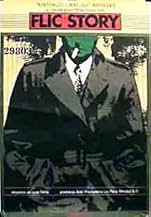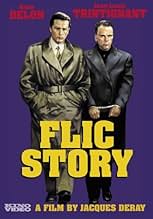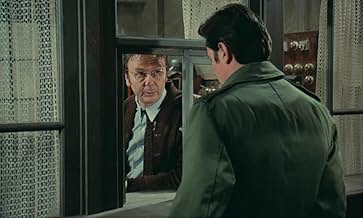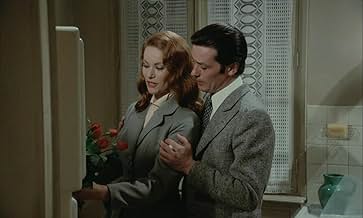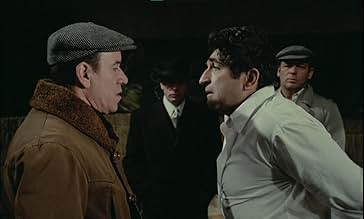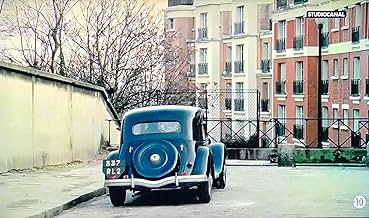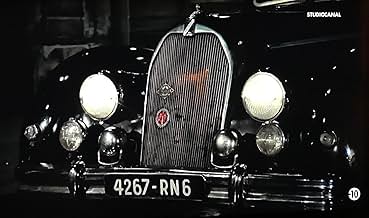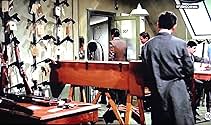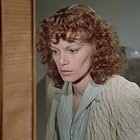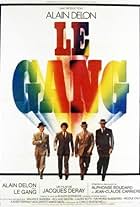Flic Story
- 1975
- 1h 52m
IMDb RATING
6.9/10
3.3K
YOUR RATING
The hunt for a seasoned killer becomes a matter of life for a policeman. Action-packed drama based on real events.The hunt for a seasoned killer becomes a matter of life for a policeman. Action-packed drama based on real events.The hunt for a seasoned killer becomes a matter of life for a policeman. Action-packed drama based on real events.
- Director
- Writers
- Stars
- Director
- Writers
- All cast & crew
- Production, box office & more at IMDbPro
Featured reviews
Sitting through this for the first time I was under the delusion it had been directed by Melville, although it didn't seem to be quite his style. Unsurprisingly, it wasn't, but by someone called Deray, whom I'd never heard of. The history of the pursuit, over several years, of a dedicated cop after an unrestrained and ruthless thief and killer, it turns out to be a masterpiece, with depth. Gradually it grows clear that the two men are psychologically related: two sides of one coin. It dawns on the viewer, or it did on this one, that it's to be doubted if there's anything that can be called free will. Both men are creatures of circumstance, who have not really chosen their destinies. There is a curious rapport between them. Cops need robbers, like cowboys need Indians. Each can look on the other and think: there, but for arbitrary fortune, go I. Buisson's use of his gun seems as natural and spontaneous as any of Tarantino's reservoir dogs. Borniche suffers his own harassment and pressures. No man chooses his birth or the pattern of his life. Or does he ? A thought-inducing experience.
'Flic Story' (1975) is one of the last films in a remarkable series of films 'noir' inspired by the world of French gangsters, made between the 1950s and the 1970s. The master of the genre was Jean-Pierre Melville, whose last film, 'Un flic' from 1972, cast Alain Delon as a crime fighting policeman. Rumor goes that when Jacques Deray undertook the making of this film inspired by a real case and true characters, after having managed to secure the participation of the two actors, he intended to give Delon the role of the gangster and Jean-Louis Trintignant that of the vigilante policeman. It would have been closer to the profiles of the previous roles played by the two, but it would have been a shame. The reversal of roles allows Trintignant to create one of the best performances of his career, and Delon is not bad at all either. The result was a film that Melville would surely have approved of.
Roger Borniche, whose memoirs inspired the film's script, had been a hero during World War II, who had enrolled in the police force because of a personal history. Idealistic, individualistic, unconventional in his choice of working methods, he often comes into conflict with his superiors and his entourage of bureaucratic colleagues, some of whom bear the burden of collaboration during the war. Having reached the position of inspector and with ambitions for advancement, he receives as a mission the capture of Emile Buisson, an escaped and extremely dangerous gangster who flees justice, robs and leaves corpses behind. The mission will not be simple and the pursuit will last many years.
The script is built as an alternation of scenes in which the policeman and the escaped criminal appear, the two meeting only at the end. The duel between Borniche and Buisson in the film translates into an artistic duel between the two great actors, among the most popular and appreciated of their generation. If a winner must be declared, he is Trintignant. They say that the roles of bad guys are easier to interpret. It may be true, but Trintignant's gaze of a killer (sometimes out of pleasure) can still freeze the blood in the veins of viewers. The criminal has one softer side: he loves Edith Piaf's music, and this will play a role in his capture, in an anthological scene. The entire cast is very well chosen and directed, the characters are credible, the milieu of crime and the police methods and stations of the 40s-50s are very authentically reconstructed. The only criticism I would make of the script is that it does not reflect the passage of time. The pursuit lasted for many years and became an obsession for the French media but also for the police, however the events unfold on screen in the almost two hours of cinema without marking the cinematic time. The screenwriters may have relied on the fact that this case was still present in the public memory of France in the 70s, but that is no longer true today. However, this is only a minor detail in an engaging and atmospheric film, which is worth watching or rewatching.
Roger Borniche, whose memoirs inspired the film's script, had been a hero during World War II, who had enrolled in the police force because of a personal history. Idealistic, individualistic, unconventional in his choice of working methods, he often comes into conflict with his superiors and his entourage of bureaucratic colleagues, some of whom bear the burden of collaboration during the war. Having reached the position of inspector and with ambitions for advancement, he receives as a mission the capture of Emile Buisson, an escaped and extremely dangerous gangster who flees justice, robs and leaves corpses behind. The mission will not be simple and the pursuit will last many years.
The script is built as an alternation of scenes in which the policeman and the escaped criminal appear, the two meeting only at the end. The duel between Borniche and Buisson in the film translates into an artistic duel between the two great actors, among the most popular and appreciated of their generation. If a winner must be declared, he is Trintignant. They say that the roles of bad guys are easier to interpret. It may be true, but Trintignant's gaze of a killer (sometimes out of pleasure) can still freeze the blood in the veins of viewers. The criminal has one softer side: he loves Edith Piaf's music, and this will play a role in his capture, in an anthological scene. The entire cast is very well chosen and directed, the characters are credible, the milieu of crime and the police methods and stations of the 40s-50s are very authentically reconstructed. The only criticism I would make of the script is that it does not reflect the passage of time. The pursuit lasted for many years and became an obsession for the French media but also for the police, however the events unfold on screen in the almost two hours of cinema without marking the cinematic time. The screenwriters may have relied on the fact that this case was still present in the public memory of France in the 70s, but that is no longer true today. However, this is only a minor detail in an engaging and atmospheric film, which is worth watching or rewatching.
The best performances for both Trintignant and Delon, based on a true story dig in the criminal files of the French police. Classical, nothing unexpected but so brilliantly made, pulled by excellent acting and directing. Trintignant told later that he disliked the character he played here, so far from his own sensibility; and that's precisely for this reason that's his performance is awesome. The true definition of a true actor, who can play characters totally different from himself. Don't miss his glance, his terrific and terrifying glance, maybe more terrifying than the real Emile Buisson himself. One of most cold blooded killer that the movie- and not only French - industry has ever shown. Great ending too.
A ruthless gangster (Trintignant) is on the loose and he seems to be killing for fun. But inspector Borniche (Delon) is on his tail.
Set in immediate postwar France (1947) this is based on a true story (from Borniche himself). Everything about this movie is spot-on : the direction, the actors, the impeccable recreation of France in the forties, etc... Delon is perfect as the laconic inspector and Trintignant as the coldblooded gangster whose favourite handgun is the Walther P38, a Germanmade pistol (as repeated frequently in the movie). You will be at the edge of your seat : they don't make 'em like that anymore !
As 'Roman-Policiers' go this is pretty good with its muted tones and sense of period and of Jacques Deray's output is the one that comes nearest to the style of Jean-Pierre Melville although one can never beat the original! It stars Alain Delon who made nine films with Deray and filmed the last of his three with Melville in 1972.
Roger Borniche who died last year at 101, utilised his experiences as a Police Inspector to inform his series of crime novels. This film deals with his most famous exploit in which he uses his resourcefulness and unorthodox methods to capture Emile Buisson, France's Public Enemy number 1 of 1950.
Delon is at the height of his popularity here and although far too attractive as Borniche he brings his customary 'edge' and aura of unpredictability to the role which I think is one of his best.
Everyone loves a villain so they say, not least actors(!) and the superlative Jean-Louis Trintignant relishes the role of psychopath Buisson. Being a thoroughly bad boy he naturally exerts a fascination over the female of the species and even Borniche's partner played by Claudine Auger, remarks on his lovely eyes!
As expected there are plenty of interesting 'types' here and mention must be made of Paul Crauchet who impresses as a petty criminal forced to turn informer.
An extra dimension is added here in the relationship that develops between Borniche and Buisson during the lengthy interrogations that take place after Buisson's arrest. It has been suggested that policemen have an inverted criminal mentality and here Borniche certainly adopts some highly questionable methods to get his man. These two characters could be said to represent both sides of the same coin. It is, according to Borniche, the childhood of Buisson that made his life of crime inevitable. The question as to whether it is Nature or Nurture or indeed a combination of both that makes us what we are is unlikely ever to be resolved.
Roger Borniche who died last year at 101, utilised his experiences as a Police Inspector to inform his series of crime novels. This film deals with his most famous exploit in which he uses his resourcefulness and unorthodox methods to capture Emile Buisson, France's Public Enemy number 1 of 1950.
Delon is at the height of his popularity here and although far too attractive as Borniche he brings his customary 'edge' and aura of unpredictability to the role which I think is one of his best.
Everyone loves a villain so they say, not least actors(!) and the superlative Jean-Louis Trintignant relishes the role of psychopath Buisson. Being a thoroughly bad boy he naturally exerts a fascination over the female of the species and even Borniche's partner played by Claudine Auger, remarks on his lovely eyes!
As expected there are plenty of interesting 'types' here and mention must be made of Paul Crauchet who impresses as a petty criminal forced to turn informer.
An extra dimension is added here in the relationship that develops between Borniche and Buisson during the lengthy interrogations that take place after Buisson's arrest. It has been suggested that policemen have an inverted criminal mentality and here Borniche certainly adopts some highly questionable methods to get his man. These two characters could be said to represent both sides of the same coin. It is, according to Borniche, the childhood of Buisson that made his life of crime inevitable. The question as to whether it is Nature or Nurture or indeed a combination of both that makes us what we are is unlikely ever to be resolved.
Storyline
Did you know
- TriviaBased on a true story.
- ConnectionsFeatured in Jinek: Episode #2.9 (2014)
- How long is Flic Story?Powered by Alexa
Details
- Release date
- Countries of origin
- Language
- Also known as
- Cop Story
- Filming locations
- 8 Rue Désirée, Paris 20, Paris, France(Buisson hides out at Suzanne's apartment)
- Production companies
- See more company credits at IMDbPro
- Runtime1 hour 52 minutes
- Sound mix
- Aspect ratio
- 1.66 : 1
Contribute to this page
Suggest an edit or add missing content

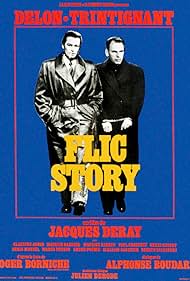
![Bande-annonce [OV]](https://m.media-amazon.com/images/M/MV5BNTg2NDc4MzgtZTFmZi00NTM2LWI4MmYtNjAzZGFiYzE5MmIyXkEyXkFqcGdeQXRyYW5zY29kZS13b3JrZmxvdw@@._V1_QL75_UX500_CR0,47,500,281_.jpg)
